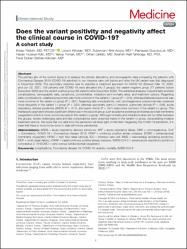Does the variant positivity and negativity affect the clinical course in COVID-19?: a cohort study

Göster/
Erişim
info:eu-repo/semantics/openAccessTarih
2023Yazar
Yıldırım, ErkanKılıçkan, Levent
Aksoy, Süleyman Hilmi
Gözüküçük, Ramazan
Kılıç, Hasan Hüseyin
Tomak, Yakup
Dalkılıç, Orhan
Tanboğa, İbrahim Halil
Kılıçkan, Fevzi Duhan Berkan
Üst veri
Tüm öğe kaydını gösterKünye
Yildirim, E., Kilickan, L., Aksoy, S. H., Gozukucuk, R., Kilic, H. H., Tomak, Y., Dalkilic, O., Tanboga, I. H., & Kilickan, F. D. B. (2023). Does the variant positivity and negativity affect the clinical course in COVID-19?: A cohort study. Medicine, 102(9), e33132. https://doi.org/10.1097/md.0000000000033132Özet
The primary aim of the current study is to analyze the clinical, laboratory, and demographic data comparing the patients with Coronavirus Disease 2019 (COVID-19) admitted to our intensive care unit before and after the UK variant was first diagnosed in December 2020. The secondary objective was to describe a treatment approach for COVID-19. Between Mar 12, 2020, and Jun 22, 2021, 159 patients with COVID-19 were allocated into 2 groups: the variant negative group (77 patients before December 2020) and the variant positive group (82 patients after December 2020). The statistical analyses included early and late complications, demographic data, symptoms, comorbidities, intubation and mortality rates, and treatment options. Regarding early complications, unilateral pneumonia was more common in the variant (−) group (P = .019), whereas bilateral pneumonia was more common in the variant (+) group (P < .001). Regarding late complications, only cytomegalovirus pneumonia was observed more frequently in the variant (−) group (P = .023), whereas secondary gram (+) infection, pulmonary fibrosis (P = .048), acute respiratory distress syndrome (ARDS) (P = .017), and septic shock (P = .051) were more common in the variant (+) group. The therapeutic approach showed significant differences in the second group such as plasma exchange and extracorporeal membrane oxygenation which is more commonly used in the variant (+) group. Although mortality and intubation rates did not differ between the groups, severe challenging early and late complications were observed mainly in the variant (+) group, necessitating invasive treatment options. We hope that our data from the pandemic will shed light on this field. Regarding the COVID-19 pandemic, it is clear that there is much to be done to deal with future pandemics.
















